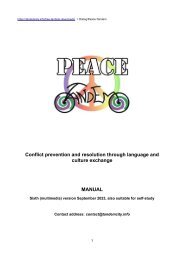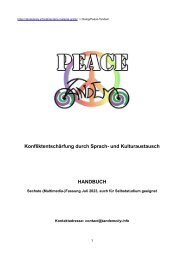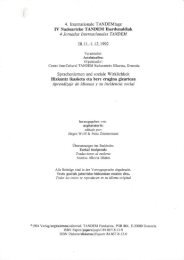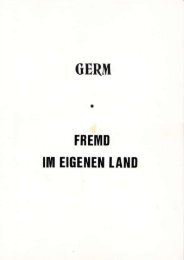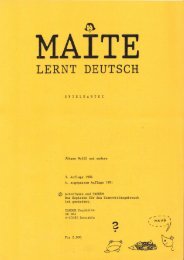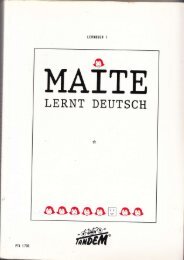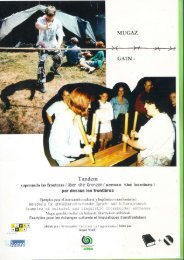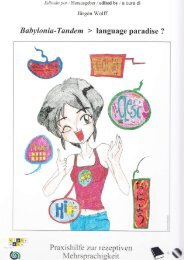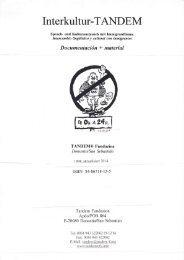Tandem-Neuigkeiten 19oct01
All about tandem language exchanges
All about tandem language exchanges
Erfolgreiche ePaper selbst erstellen
Machen Sie aus Ihren PDF Publikationen ein blätterbares Flipbook mit unserer einzigartigen Google optimierten e-Paper Software.
Ten vears a-qo, the Association for Teacher Training In TEFL ( ATT ) was founded by Dr<br />
Kevin McGinley in Dublin and , then brought to fruition by a group of people (the present<br />
writer included) with the aims and objectives of creating and providing quality teacher-training<br />
courses in lreland comparable to the best of what had been on offer in Britain for more than a<br />
generation before that. A panel of moderators guaranteed standards and a suite of eight<br />
separate teacher-training courses were produced over the years, including two courses specialising<br />
in Distance Learning for Teachers of English as Foreign Language (TEFL).<br />
a) Content<br />
There is nothing radically new about the ATT Distance Learning Teacher-Training courses.<br />
They offer as much as can be presented in such circumstances to enable the trainee to inform<br />
himself / herself as comprehensively as possible about the world of English Language Teaching.<br />
Naturally, there is always room for improvement and the ATT will seek to include<br />
whatever is needed to ensure that the trainee is given more personal support in his/her studies<br />
than would be possible in a contact course.<br />
The introductory course includes an overview of the history of the development of the<br />
language, teaching methodologies, the four principal skills, phonetics, teaching aids, lesson<br />
plans, and how to analyse errors. Each unit has a number of assignments which have to be<br />
completed and returned, culminating in an end-of-course test. It is hoped that the trainee will<br />
also find the time to read some of the books listed in the bibliographies supplied. But by and<br />
large. the material provided should be in itself sufficient, after a hundred hours' study, to equip<br />
a teacher with the knowledge required to enter a classroom and teach.<br />
Despite the fact that teachers who wish to work in the field of TEFL in Ireland are graduates,<br />
most of the trainees would encounter their greatest diffEculties in dealing with the grammar<br />
unit, as many of them would not have studied English grammar formally at school. This is<br />
where the training can be compared to driving lessons where the learner finds out about the<br />
engine, the nuts and bolts of the language. Although we try to avoid "lifting the bonnet" as<br />
much as possible in the classroom, a knowledge of the metalanguage is mandatory as it<br />
deepens the trainee's appreciation of how a language works effectively.<br />
But this is where it gets personal: some trainees about to embark on stint or even a career of<br />
TEFL are naturally embarrassed about exposing their lack of knowledge of the blueprint of the<br />
language, but e-learning allows them to drop their defence mechanisms and genuinely work<br />
with the trainer on questions of grammar that may never have occurred to them before. The<br />
fact that the medium is currently exclusively in writing also helps to enhance their writing skills<br />
(and spelling!) which have seriously deteriorated amongst schoolleaves for a generation. As<br />
the medium is generally 1:1, they don't have to worry about making a fool of themselves in<br />
front of their peers in the classroom or about taking up valuable classroom time by asking<br />
what they might perceive to be silly questions. They are not pressurised and restricted by the<br />
tyranny of a class hour or afraid that they have been left behind because they missed a class or<br />
weren't in the mood or slipped into a daydream while looking out of the window. Generally,<br />
there is no time for questions such as Why do we use the word do in some questions and<br />
negatives and not in others? A-fter all, they are supposed to know that already, aren't they?<br />
And if they don't know. they should know where to go to find out. (Shouldn't they?)<br />
b) Technique<br />
The imparting of skills relating to style or technique in distance training presents greafer<br />
challenges for the trainer but as stated above, in the final analysis the only way to learn how to<br />
teach is to teach. And we all have our own stvles. thank goodness.



